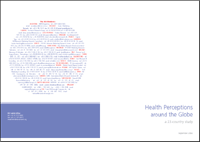World Health Care Systems 'In Crisis'
Global survey shows public concern -- but money isn't the answer
A MAJOR study conducted in 23 countries shows a majority of people -- in many cases a large majority -- believe their nation's health care system is "in a state of crisis". But although half (52%) the British public think this, larger majorities in 19 other countries believe their own health care systems are 'in crisis'.
These include France, where 58% of people feel their nation's health care system is in crisis, USA (65%), Germany (78%) and Poland (the highest at 93%). The average across all 23 countries shows 65% feel their nation's health care systems are in crisis, and 31% feel they are in 'good shape'.
But the study reveals that money is not necessarily thought to be the answer to health care problems. In most countries the public blame inefficient management rather than insufficient funding. In Britain, half (49%) blame management compared with 37% who blame funding problems.
The study, one of the most comprehensive of its kind, was conducted by International Research Institutes (IriS), a network of independent marketing research companies in Europe, Asia/Pacific, Africa and North and South America. The British part of the study was conducted by MORI. Other key findings from the project include:
- Most people describe their personal state of health as good. The Irish are most likely to say they are in excellent health -- a third say so (34%) compared with a quarter of Britons (25%). The least likely are residents of China, Japan, Kazakhstan, Korea, Mexico, Poland, and the Russian Federation.
- There are very few instances in which a majority in any country dismisses any of six specific factors affecting personal health -- diet, physical exercise, tobacco use, excessive alcohol use, stress/anxiety, and outlook on life -- as not very/not all important.
- The effects of tobacco use draw the broadest range of responses. France and Poland consider it a leading factor in personal health -- as do Britons -- but a majority in the Czech Republic, Indonesia and Mexico dismiss tobacco use as a not very/not at all important.
- There is a strong consensus in all but three of the 23 countries that health care systems should be publicly rather than privately financed. Britons share this view, with 79% supporting funding through taxation.
Janette Henderson, from MORI, said: "There is a growing awareness that it is not enough to simply throw money at the traditional delivery systems of medical personnel, equipment and facilities".
"Moreover, in many countries over the past few decades, the role of health care systems has shifted towards more holistic approaches that put more emphasis on the prevention of illness, rather than simply treating illness after it occurs, and toward greater individual responsibility for the state of one's personal health."
Technical details
Interviews were conducted among a total of 19,995 residents of 23 countries during the months of June to August, 2004. Respondents were aged 18 or older, except in eight countries (China, the Czech Republic, Great Britain, Ireland, Italy, the Netherlands, Sweden and Switzerland) where the samples included a small number of people (just two per cent of the total multi-country sample) who were between the ages of 14 and 17. All of the research companies involved are members of IriS.
Number of Interviews Unweighted: Argentina 502; Canada 2,020; China 500; Czech Republic 515; France 500; Germany 504; Great Britain 1,002; Greece 500; Indonesia 1,000; Ireland 1,199; Italy 1,004; Japan 2,000; Kazakhstan 1,200; Korea 454; Mexico 1,253; Netherlands (The) 1,003; Nigeria 1,000; Poland 810; Russian Federation 517; Spain 500; Sweden 504; Switzerland 1,005; United States 503
Each country's data were weighted (up or down) to 1,000 so that all have equal impact on the final results. Where necessary, tables were weighted to effect approximately equal distributions of men (48%) and women (52%).
A breakdown of figures, by country, are available from Janette Henderson.




